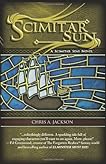 Marque and Reprisal
Marque and Reprisal by
Elizabeth Moon
My rating:
4 of 5 stars
[Note: This review was originally written in 2005.]
Welcome aboard the
Gary Tobai, cargo specialist! Prepare yourself for a crash course in murder, mercenaries, mutiny, and letters of marque. Writing a sequel to
Trading in Danger might be considered a tall order, but
Elizabeth Moon proves she’s up to the task with
Marque and Reprisal. The daring, young heroine, Kylara Vatta, newest captain in the Vatta Transport fleet, returns in this sweeping adventure filled with action, suspense, intrigue, combat... and a puppy.
After the near disastrous events in the Sabine system, Kylara finds herself, her crew, and her ship facing some very tough odds. Ky has no choice but to plunge onward relying on her seasoned crew, her training and intuition, and sometimes just a little luck. Attacks against Vatta Transport, the communications assets of ISC, and the Vatta family itself leave Captain Kylara Vatta of the
Gary Tobai isolated from direct aid and consul from corporate headquarters. She is left with little choice but to improvise after learning of the widespread attacks upon Vatta headquarters, ships, and personnel. Ky formulates a three step plan that encompasses their best hope for survival: locate and protect surviving Vatta family members, identify the source of the attacks against the Vatta family and assets, and conduct a counterattack against those enemies.
Along the way, Ky gathers allies to help her in her mission. Stella, a cousin whose past mistakes have marked her as a black sheep; Rafe, a shady character from Stella’s less than laudable early years; fourteen-year-old Toby Vatta, lone survivor of the destruction of the
Ellis Fabery; and the mercenaries of the Mackensee Military Assistance Corporation. Attempts on her life by unknown assassins, run-ins with the police while her ship is docked, problems caused by failure of the ISC communications system, the attempted destruction of her ship, and the sense that disaster is always lurking just out of view all combine to keep one turning pages. My pang of disappointment at the end of the book, when I realized there were no more pages to read, was tempered by the knowledge that
Engaging the Enemy will be available next spring. I know I’ll be waiting in line for my copy.
Marque and Reprisal stands on its own but, since it was intended as the second in a series of novels, it may suffer a loss of impact and continuity if one has not read
Trading in Danger, the first book of the series. Enough background information is doled out to cobble together a vague awareness of earlier exploits, but reading the books of the “Vatta’s War” series in order will lend a much greater understanding of the action in
Marque and Reprisal, particularly the action detailed in the first few chapters.
Moon’s accessible style of writing lends itself well to development of well-defined characters within a believable star-faring society. The end result is this briskly paced and thoroughly enjoyable interstellar escapade. So, if science fiction adventure is your cup of tea, take a big sip.
Elizabeth Moon maintains a website at
http://www.elizabethmoon.com/
View all my reviews
 Dwarfs by Time-Life Books
Dwarfs by Time-Life Books















